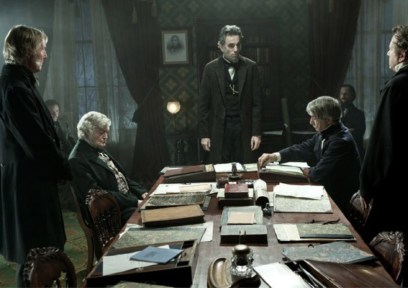 Hollywood rarely gets the faith side of history right. Steven Spielberg rarely gets it wrong. His stirring film "Amistad
Hollywood rarely gets the faith side of history right. Steven Spielberg rarely gets it wrong. His stirring film "Amistad," for example, contains one of the most moving renditions of Christian truth ever filmed. In his masterful new film, "Lincoln
," faith is treated only fleetingly, which is surprising because Abraham Lincoln is revered as our most spiritual president. In fairness, the film is not a biography but an exploration of Lincoln during the battle for passage of the 13th Amendment. That it accomplishes this task so magnificently is a gift to the nation.
Yet this scant treatment of faith may be due to the nature of Lincoln's spirituality itself. His religious life has been one of the most ill-defined, hotly debated topics in Lincoln studies since nearly the moment he died. Historians still grapple with these matters, and the filmmakers who must rely on their work may find the entire matter of Lincoln's spiritual life too contentious and unsettling to pursue. Still, Lincoln's great struggle for faith shaped him profoundly, and we should know this story in order to fully understand the imprint he is having, even now, upon our age.
Crooked path
The challenge is that Lincoln lived through widely differing stages in his journey of faith. There is always the temptation to see his entire religious life through the prism of only one of these stages. To do this means missing the grand tapestry of faith that Lincoln wove during years of spiritual struggle.
There is, for example, the stage of Lincoln's childhood years. Until early manhood, he was an intelligent, sensitive child who resented his father, found bombastic frontier revivals disturbing and, yet, was capable of repreaching the sermons he had heard almost word for word. Then there is Lincoln the young man, a voracious reader smitten with religious skeptics such as Thomas Paine and remembered by the townspeople of New Salem, Ill., as the village atheist.
Presidential crucible
The death of his son Eddie in 1850 devastated Lincoln. He turned for help to a minister friend, the Rev. James Smith, who offered comfort and learned challenge to Lincoln's skepticism. It changed him. In this third phase of Lincoln's spiritual life, he attended church, funded Christian ministries, befriended clergymen and spoke more openly of God. Then he entered the White House.
The bookends of his first and second inaugural addresses define the transition to yet another stage of faith. Though in his First Inaugural on March 4, 1861, he referred to a God who has "never yet forsaken this favored land"; he perceived the war as under human control. "In your hands," he told the departing Confederate states, "is the momentous issue of civil war."
By his second inaugural four years later, he had seen too much suffering, had witnessed too many inexplicable Union defeats. He concluded that God had visited the war upon the nation as punishment for the sin of slavery. In this second inaugural, he spoke as prophet of an offended God.
Clearly, he had begun to believe in a God who ruled men and nations, but had he yet become a Christian? We cannot know with certainty, though Mary Lincoln's account of her husband's final words raises intriguing possibilities. Confiding to a Baptist minister a decade after her husband's death, Mary recalled that on April 14, 1865, the president assured her that following the war: "We will go abroad among strangers where I can rest. …We will visit the Holy Land and see those places hallowed by the footsteps of the savior."
If Mary remembered correctly, these were the last words Lincoln spoke. John Wilkes Booth's derringer ball entered his brain in the next seconds. If true, it means that a dramatic progression of faith had been underway in Lincoln's life. We cannot know where it might have ended. We can know that Lincoln had journeyed at least as far as the religious vision of the Second Inaugural Address—to a just God both terrible and kind who works in history to draw men to righteousness.
Lincoln's struggle for religious truth is a story Americans should know, even with its uncertainties. It broke him, healed him and helped to lift him to his great purpose. It was a struggle not unlike our own. We should be grateful then, for what faith element does appear in Lincoln, and grateful also that his spirit is being freshly imprinted upon our troubled times. Thank you, Steven Spielberg.
Stephen Mansfield is the author of Lincoln's Battle with God: A President's Struggle with Faith and What It Meant for America